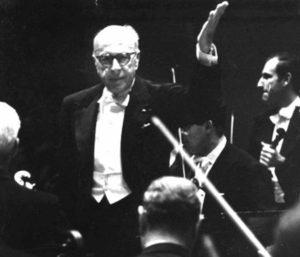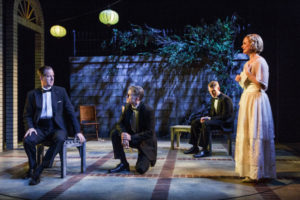 The main titles and prologue of Laurence Olivier’s 1944 film version of Shakespeare’s Henry V. The score is by William Walton:
The main titles and prologue of Laurence Olivier’s 1944 film version of Shakespeare’s Henry V. The score is by William Walton:
(This is the latest in a series of arts-related videos that appear in this space each Monday, Wednesday, and Friday)
Terry Teachout on the arts in New York City
 “Skepticism as a philosophy is not merely doubt, but what may be called dogmatic doubt. The man of science says ‘I think it is so-and-so, but I am not sure.’ The man of intellectual curiosity says ‘I don’t know how it is, but I hope to find out.’ The philosophical Skeptic says ‘nobody knows and nobody ever can know.’ It is this element of dogmatism that makes the system vulnerable.”
“Skepticism as a philosophy is not merely doubt, but what may be called dogmatic doubt. The man of science says ‘I think it is so-and-so, but I am not sure.’ The man of intellectual curiosity says ‘I don’t know how it is, but I hope to find out.’ The philosophical Skeptic says ‘nobody knows and nobody ever can know.’ It is this element of dogmatism that makes the system vulnerable.”
Bertrand Russell, A History of Western Philosophy
In today’s Wall Street Journal “Sightings” column I look at the current rash of symphony-orchestra strikes, and offer a historical perspective. Here’s an excerpt.
* * *
 Two American orchestras, in Fort Worth, Texas, and Pittsburgh, are currently on strike, and a third, the Philadelphia Orchestra, recently settled an opening-night strike. Such conflicts are becoming common, and as usual, money is to blame. It’s the old, old story: Management says there’s no more cash in the till and proposes to cut salaries. The players reply that there are better ways to trim the budget. Result: Stalemate, followed by picket lines….
Two American orchestras, in Fort Worth, Texas, and Pittsburgh, are currently on strike, and a third, the Philadelphia Orchestra, recently settled an opening-night strike. Such conflicts are becoming common, and as usual, money is to blame. It’s the old, old story: Management says there’s no more cash in the till and proposes to cut salaries. The players reply that there are better ways to trim the budget. Result: Stalemate, followed by picket lines….
It’s worth remembering—yet hardly ever mentioned in news reports—that in the U.S., most orchestral musicians make a lot more money than they did only a couple of generations ago….
My quest for perspective began with “Tales From the Locker Room,” an oral history of the Cleveland Orchestra published in 2015. Lawrence Angell and Bernette Jaffe, the authors, interviewed Arnold Steinhardt, who played under George Szell in Cleveland before becoming the first violinist of the Guarneri Quartet in 1964. When he joined the orchestra in 1959, Mr. Steinhardt recalled, “Most of the orchestra, with families to feed, did what they could to make a living….Sam Salkin, first violin, tried to sell me a watch; Ed Matey, second violin, offered me mutual funds; Irv Nathanson, double bass, wondered if I needed instrument insurance; and Angie Angelucci, French horn, tried to sell me a Plymouth.”
 Mr. Steinhardt wasn’t exaggerating. Prior to 1968, membership in the Cleveland Orchestra was a part-time job. When he joined the orchestra, the regular season was just 30 weeks long, with lower pay for summer concerts. In 1952, the base salary was $3,240—$29,231 in today’s dollars. By 1967, it had only gone up to $11,700. (The current base salary is $120,000.) The U.S. median household income in 1967, by contrast, was $7,970. According to a 1952 survey, 60% of the players moonlighted in non-musical jobs…
Mr. Steinhardt wasn’t exaggerating. Prior to 1968, membership in the Cleveland Orchestra was a part-time job. When he joined the orchestra, the regular season was just 30 weeks long, with lower pay for summer concerts. In 1952, the base salary was $3,240—$29,231 in today’s dollars. By 1967, it had only gone up to $11,700. (The current base salary is $120,000.) The U.S. median household income in 1967, by contrast, was $7,970. According to a 1952 survey, 60% of the players moonlighted in non-musical jobs…
Yes, the Cleveland Orchestra was a regional ensemble notorious in the music business for its stingy salaries—but George Szell, who became its music director in 1947, somehow managed to turn it into one of the world’s finest orchestras anyway….
Should the members of the Cleveland Orchestra have been paid far more in Szell’s day? Obviously. Do they, and their colleagues in other American orchestras, deserve to be paid salaries in accord with their artistry, as well as with the years of painstaking effort that went into mastering their craft? Of course. I used to be a bass player, and nobody needs to tell me how hard orchestral musicians work. But lots of other people think they “deserve” to make higher salaries, often with good reason….
* * *
Read the whole thing here.
George Szell rehearses the Cleveland Orchestra in the first movement of Beethoven’s Fifth Symphony in 1966:
Here’s my list of recommended Broadway, off-Broadway, and out-of-town shows, updated weekly. In all cases, I gave these shows favorable reviews (if sometimes qualifiedly so) in The Wall Street Journal when they opened. For more information, click on the title.
BROADWAY:
• An American in Paris (musical, G, too complex for small children, closes Jan. 1, reviewed here)
• The Color Purple (musical, PG-13, some performances sold out last week, reviewed here)
• The Encounter (one-man immersive drama, PG-13, many performances sold out last week, closes Jan. 8, reviewed here)
• Hamilton (musical, PG-13, Broadway transfer of off-Broadway production, all performances sold out last week, reviewed here)
• Matilda (musical, G, closes Jan. 1, reviewed here)
• On Your Feet! (jukebox musical, G, reviewed here)
OFF BROADWAY:
• The Fantasticks (musical, G, suitable for children capable of enjoying a love story, reviewed here)
 • The Roads to Home (drama, G/PG-13, not suitable for children, closes Nov. 27, reviewed here)
• The Roads to Home (drama, G/PG-13, not suitable for children, closes Nov. 27, reviewed here)
• Sense & Sensibility (serious romantic comedy, G, remounting of 2014 off-Broadway production, closes Nov. 20, original production reviewed here)
CLOSING SOON IN WASHINGTON, D.C.:
• Sense & Sensibility (serious romantic comedy, G, remounting of 2014 off-Broadway production, closes Oct. 30, original production reviewed here)
CLOSING NEXT WEEK OFF BROADWAY:
• A Day by the Sea (drama, G, not suitable for children, closes Oct. 30, reviewed here)
• A Taste of Honey (drama, PG-13, closes Oct. 30, reviewed here)
CLOSING FRIDAY IN CHICAGO:
• Wonderful Town (musical, G, reviewed here)
 “I always thought that one secret of a good western, with the exception maybe of High Noon, is that the story’s problem is not the leading man’s problem. The leading man should be able to walk away at any point, but he chooses not to, and that’s what makes him a hero.”
“I always thought that one secret of a good western, with the exception maybe of High Noon, is that the story’s problem is not the leading man’s problem. The leading man should be able to walk away at any point, but he chooses not to, and that’s what makes him a hero.”
Burt Kennedy (quoted in The Guardian, February 16, 2001)
Love-hungry bachelors of the Fifties and early Sixties were notorious for using jazz and romantic ballads to grease the skids. Frank Sinatra, I’m told, was their artist of choice, though I’ve also been assured by a number of senior citizens in a position to know that Getz/Gilberto was similarly effective. Blake Edwards notwithstanding, I’ve never met anyone who did it to Prokofiev’s Romeo and Juliet or Ravel’s Boléro, at least not more than once.
As for me, I’ve never been one to play music in intimate situations. Perhaps because I am, or used to be, a musician, I find it distracting. And I suppose it says something significant about me that while music is one of the most important things in my life–perhaps the most important thing–I don’t find it sexy, and never have….
Read the whole thing here.
An ArtsJournal Blog